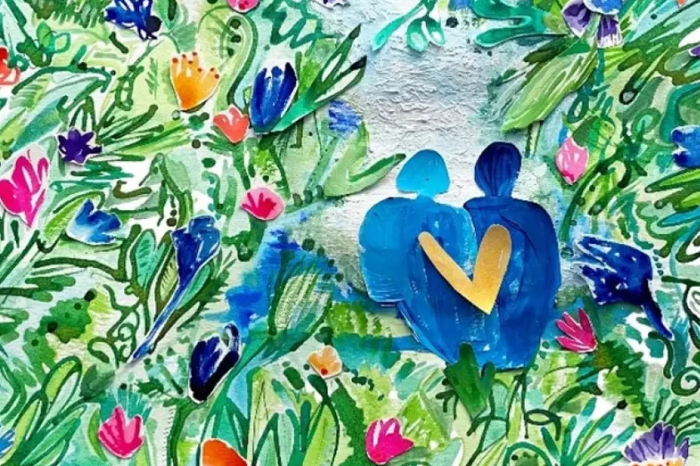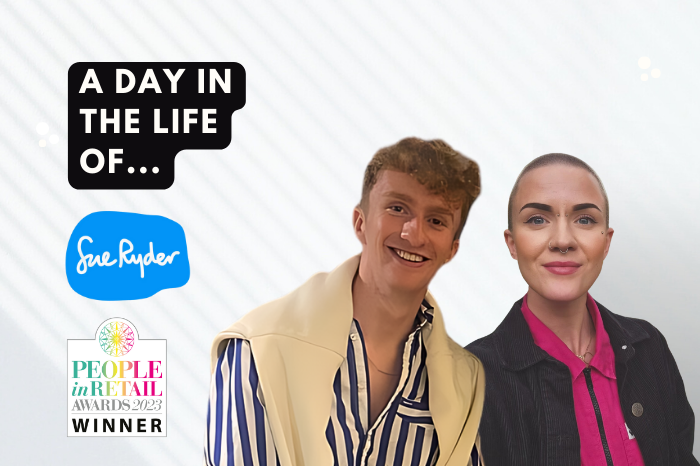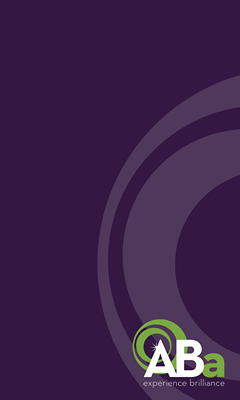Sue Ryder: From Retailer of the Year to Grief Kind – An interview with Eddie and Bluebell on pride and progress
We talk to Eddie Hartley and Bluebell Valentine from Sue Ryder to learn more about the organisation’s journey to winning Retailer of the Year at the People in Retail Awards 2023 and the progress made over the last 9 months.
Eddie is in his final year at university (studying Law and French), a Store Manager and leads Sue Ryder’s LGBTQ+ Network Community, while Bluebell is the National Volunteer Manager and Chair of the LGBTQ+ Equity and Inclusion Network. Bluebell works closely with the retail operations teams, overseeing various aspects of the shops (almost four hundred) while ensuring they continue to support the incredible palliative and bereavement care that Sue Ryder provides.
Firstly, you call it equity rather than equality. Why is that?
Eddie: I think it’s important to understand that giving everyone the same resources doesn’t always work. Our volunteers and staff have lots of different and individual needs, so rolling out equal resources and opportunities to everyone isn’t the fairest way of doing things. Distinctive characteristics need to be considered, which is why we focus on equity rather than equality – everyone getting what they need to succeed.
Some of the initiatives you highlighted last year were the Inclusion Passport and the Rainbow Badge programme. How’s that gone?
Eddie: Really amazing! The Inclusion Passport allows everyone to be open about how they can work better, and as an organisation, we really listen to that. The goal is to make sure that everyone feels included and supported.
We’ve also had phenomenal uptake with the Rainbow Badge programme, with over 1,400 participants it’s the most successful optional training programme we’ve had! The badge means “I’m someone you can talk to about LGBTQ+ identities.” Any member of the Sue Ryder team wearing a rainbow badge has completed additional training on LGBTQ+ identities, including terminology and allyship. They can help by listening, advocating, and signposting further information and support.
Bluebell: One story that stands out involves a new staff member who noticed the rainbow badge posters in the reception area when they came in for an interview. He’s a trans man who recently gave birth to a beautiful baby boy. He shared that he was initially nervous about talking about his personal life in interviews, but seeing the badges made him feel safe and allowed him to be proud of who he is. He got the job and is already making significant contributions to the organisation.
These stories show that the work we’re doing is making a tangible difference in people’s lives and helping them feel safe and supported at Sue Ryder. We’re proud of the positive change we’ve made, and it’s these individual stories that motivate us to keep going.
How do you effectively roll out programmes like these?
Bluebell: Our EDI journey began about four years ago when we really committed to it, initially focusing on staff and volunteers. It’s worth pointing out that our public is vastly different from many high street retailers because we serve patients, not just customers. Our workforce also includes around 10,000 volunteers alongside our paid staff.
Eddie: That’s a great point, and it’s important to recognise that charities wouldn’t function without volunteers. We have a dedicated team of volunteers in every store, and their commitment creates a strong bond with their store manager and fellow volunteers. If you go into any of our stores, you’ll find it’s almost like family, and the information is often cascaded down through the managers which is of course extremely helpful.
Bluebell: Of course, we do face challenges in making our EDI work truly inclusive and accessible. Lots of our colleagues work shifts or don’t have regular access to technology in their role, and we also have a diverse team in terms of accessibility requirements. We put a lot of energy into making sure everybody feels included in the work we’re doing, and we get really high engagement levels as a result.
Pride is a great example of how we ensure inclusivity in our work, and we’ve made huge progress in this area over the last few years. From window dressing competitions to LGBTQ+ peer support groups and attending Pride marches as a Sue Ryder team, there are so many ways for LGBTQ+ people and allies to get involved. In our shops we’ve created vibrant point-of-sale materials that help customers understand why our teams wear rainbow badges, while keeping the family-like feel of our shops.
We also want to make sure that the wellbeing and mental health of our teams are prioritised through Pride. This year our Chief Commercial Officer, Martin Wildsmith, recorded a video message reaffirming the Charity’s support for its LGBTQ+ workforce, and signposting colleagues to a wide range of practical and emotional support available through Pride and beyond. The video has been shared through internal communications and it’s prominent via QR code in the Pride resource packs we post to shops. We’ve also shared it on our volunteer Facebook group, and the volunteer e-newsletter to ensure everyone has access.
Eddie: Yes, Pride is a great example of how we ensure that everyone feels included. The Pride window-dressing competition is amazing because staff and volunteers love participating, in fact many now just get going with events like this without prompt.
What lessons have been learnt over the last 12 months, and what’s next?
Bluebell: We’ve recently appointed a Head of Health Inequalities, so now we’re shifting our focus toward patient-facing and customer-facing equity work. Healthcare and palliative care are such different worlds from retail, so we’ve had to balance those differences.
We recognise that we still have a long way to go, but we’re making progress. We’re also focusing on our Race Equity Plan, which is a huge priority for the organisation. We’ve done comprehensive surveys to identify areas for improvement and worked with consultants to develop a plan that will make our care and services more inclusive.
Eddie: We’re not afraid to own up to mistakes, learn from them, and make improvements. Despite being smaller than some of our counterparts, we make a lot of noise and are proud of the disruption we’re causing in our sector.
Bluebell: Measuring success is important too. In our annual volunteer and staff survey, we ask diversity monitoring questions alongside experience questions. This helps us see if a particular demographic is having a worse experience in one area or another, allowing us to give urgent attention where needed. It’s also great because we can see improvements in people’s experiences.

You’re also focused on the Grief Kind campaign. Can you share more about that?
Bluebell: We’ve heard countless times that people going through grief just want someone who understands their experience and can listen without judgement. Grief Kind spaces provide a supportive environment for people to get a cup of tea and offload to someone who really gets it. The feedback so far has been incredibly positive, and we see them as a lifeline for people waiting for counselling or other support.
Eddie: Yes – and we’ll continue to break down barriers through our campaigns and initiatives while building an incredible sense of community in our stores and maintaining our values. We may be small, but we’re making a big impact!














